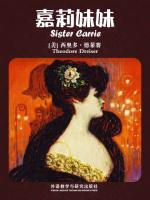Sister Carrie
骆驼祥子
"Jia Li Mei Mei" (Sister Carrie) by Theodore Dreiser is a
landmark novel in American literature, offering a vivid, unflinching
portrait of urban life and the pursuit of the American Dream at the turn
of the 20th century. The narrative follows the journey of Carrie Meeber,
a young woman who leaves her rural home in search of a better life in
the bustling cities of Chicago and New York. Dreiser's realist style and
his exploration of the complex social and economic forces at play make
this a compelling and insightful read. Carrie's character development
is central to the novel's impact. Upon arriving in Chicago, she is naive
and overwhelmed by the city's vastness and the harsh realities of urban
life. However, her determination and adaptability quickly become
apparent. Dreiser does not shy away from depicting Carrie's moral
ambiguities; she is neither wholly virtuous nor entirely corrupt.
Instead, she is portrayed as a product of her environment, driven by a
desire for material comfort and social status. This nuanced
characterization challenges the reader to grapple with the ethical
complexities of ambition and success. One of the novel's most striking
features is its depiction of the urban landscape. Dreiser's detailed
descriptions of Chicago and New York provide a backdrop that is almost a
character in itself. The cities are portrayed as places of both
opportunity and peril, where the pursuit of wealth and status can lead
to both triumph and despair. This duality is reflected in Carrie's
relationships with the men she encounters. Her involvement with Drouet
and Hurstwood illustrates the varying degrees of power and vulnerability
she experiences. Drouet represents the initial allure of the city,
offering Carrie a way out of poverty but also entangling her in a
superficial and ultimately unsatisfying relationship. Hurstwood, on the
other hand, embodies the darker side of ambition, as his descent into
ruin mirrors Carrie's rise. Dreiser's social commentary is another key
aspect of the novel. He critiques the capitalist society that values
wealth and status above all else, often at the expense of individual
integrity and happiness. The characters' struggles and aspirations
highlight the often arbitrary nature of success and the moral
compromises people make in its pursuit. This critique is particularly
relevant in today's society, where the pressures of consumerism and
social mobility continue to shape individual lives. The novel's realist
approach is also noteworthy. Dreiser's writing is marked by a
straightforward, unembellished style that eschews romanticism in favor
of a more honest portrayal of life. This realism extends to the novel's
conclusion, which does not provide a neat resolution but rather leaves
the reader with a sense of life's ongoing complexities and
uncertainties. Carrie's ultimate loneliness and dissatisfaction, despite
her material success, underscore the novel's central theme: the elusive
nature of true fulfillment. In conclusion, "Sister Carrie" is
a powerful exploration of ambition, desire, and the human condition
within the context of an evolving American society. Dreiser's ability to
weave together personal narrative and social critique makes this a
timeless work that continues to resonate with contemporary readers. The
novel challenges us to consider the costs of our aspirations and the
ways in which our environments shape our destinies. What aspects of
Carrie's journey do you find most compelling, and how do they relate to
today's societal challenges?



 京公网安备 11010802032529号
京公网安备 11010802032529号